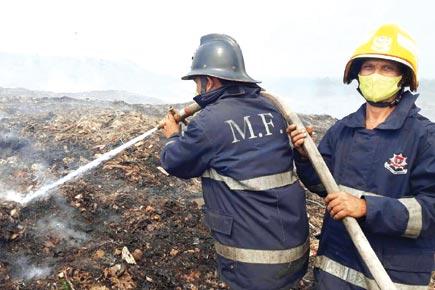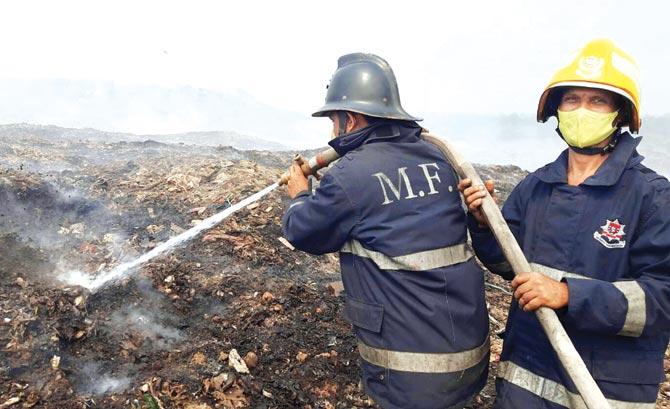The latest Deonar disaster has set lakhs of rupees on fire. Firefighting operations to contain the inferno that broke out on March 20 have cost the public exchequer Rs 36 lakh

The fire brigade estimates that it spent over Rs 3 lakh per day in dousing the flames at the Deonar dumping ground. File pic
The latest Deonar disaster has set lakhs of rupees on fire. Firefighting operations to contain the inferno that broke out on March 20 have cost the public exchequer Rs 36 lakh.
ADVERTISEMENT

The fire brigade estimates that it spent over Rs 3 lakh per day in dousing the flames at the Deonar dumping ground. File pic
Upon the outbreak of a fire, 12 fire engines and 10 water tankers were rushed to the site. Over the days, they were gradually reduced to four engines and three tankers. One fire engine is managed by seven personnel, while a water tanker has two.
So, an average of 80 personnel have been manning the vehicles per shift or 240 persons per day (one day has three shifts). Considering that a fire official across all ranks has an average salary of Rs 40,000 per month, he is paid R162 per hour or R1.04 lakh per shift (for 640 man hours). The fire brigade, thus, spends more than R3 lakh per day in manning the dump and has spent R36 lakh so far over the past 12 days. The fire brigade's annual budget is R500 crore.
A senior fire brigade official points out that the estimation does not factor in the cost of diesel, water and electricity, and the impact on human lives. "It also doesn't take into account the damage cost to my vehicles. Our fire brigade vehicles have been designed for city roads, not for slush or garbage. In the past 12 days, a number of our vehicles have been called back for repairs. And, it also does not take into account the cost to human life. What about all those people suffering due to the smoke?"
A fire official pegged the cost of firefighting operations at R5 lakh per day. "People's taxes fund such emergency operations. But certain calamities are avoidable." The March 20's fire spewed clouds of smoke, and its effects were felt as far as Navi Mumbai. Forced to take cognizance of it, the ministry of environment and forests has now directed the BMC to come out with an action plan within three months.
 Subscribe today by clicking the link and stay updated with the latest news!" Click here!
Subscribe today by clicking the link and stay updated with the latest news!" Click here!






